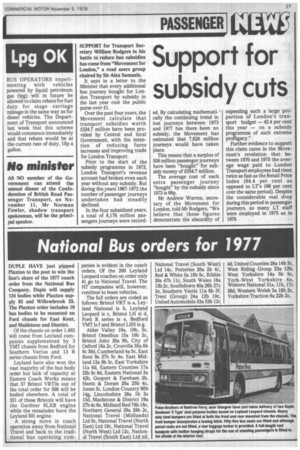Support for subsidy cuts
Page 29

If you've noticed an error in this article please click here to report it so we can fix it.
SUPPORT for Transport Secretary William Rodgers in his battle to reduce bus subsidies has come from "Movement for London," a road users group chaired by Sir Alex Samuels.
It says in a letter to the Minister that every additional bus journey bought for London Transport by subsidy in the last year cost the public purse over £1.
Over the past four years, the Movement calculate that transport subsidies worth £334.7 million have been provided by Central and local Government, with the intention of reducing fares increases and improving trade for London Transport.
Prior to the start of the subsidy programme in 1973, London Transport's revenue account had broken even each year without any subsidy. But during the years 1967-1972 the number of passenger journeys undertaken had steadily declined.
In the four subsidised years, a total of 8,178 million passengers journeys were record ed. By calculating mathemati• cally the continuing trend in lost journeys between 1973 and 1977 has there been no subsidy, the Movement has estimated that 7,620 million journeys would have taken place.
This means that a surplus of 558 million passenger journeys have been "bought" for subsidy money of £334.7 million.
The average cost of each extra passenger journey "bought" by the subsidy since 1973 is 60p.
Mr Andrew Warren, secretary of the Movement for London, told Mr Rodgers, "We believe that these figures demonstrate the absurdity of expending such a large proportion of London's transport budget 42.4 per cent this year on a subsidy programme of such extreme profligacy."
Further evidence to support this claim came in the Movement's revelation that between 1970 and 1975 the average wage paid to London Transport employees had risen twice as fast as the Retail Price Index (84.4 per cent as opposed to LT's 166 per cent over the same period). Despite the considerable real drop during this period in passenger journeys, as many LT staff were employed in 1975 as in 1970.
































































































